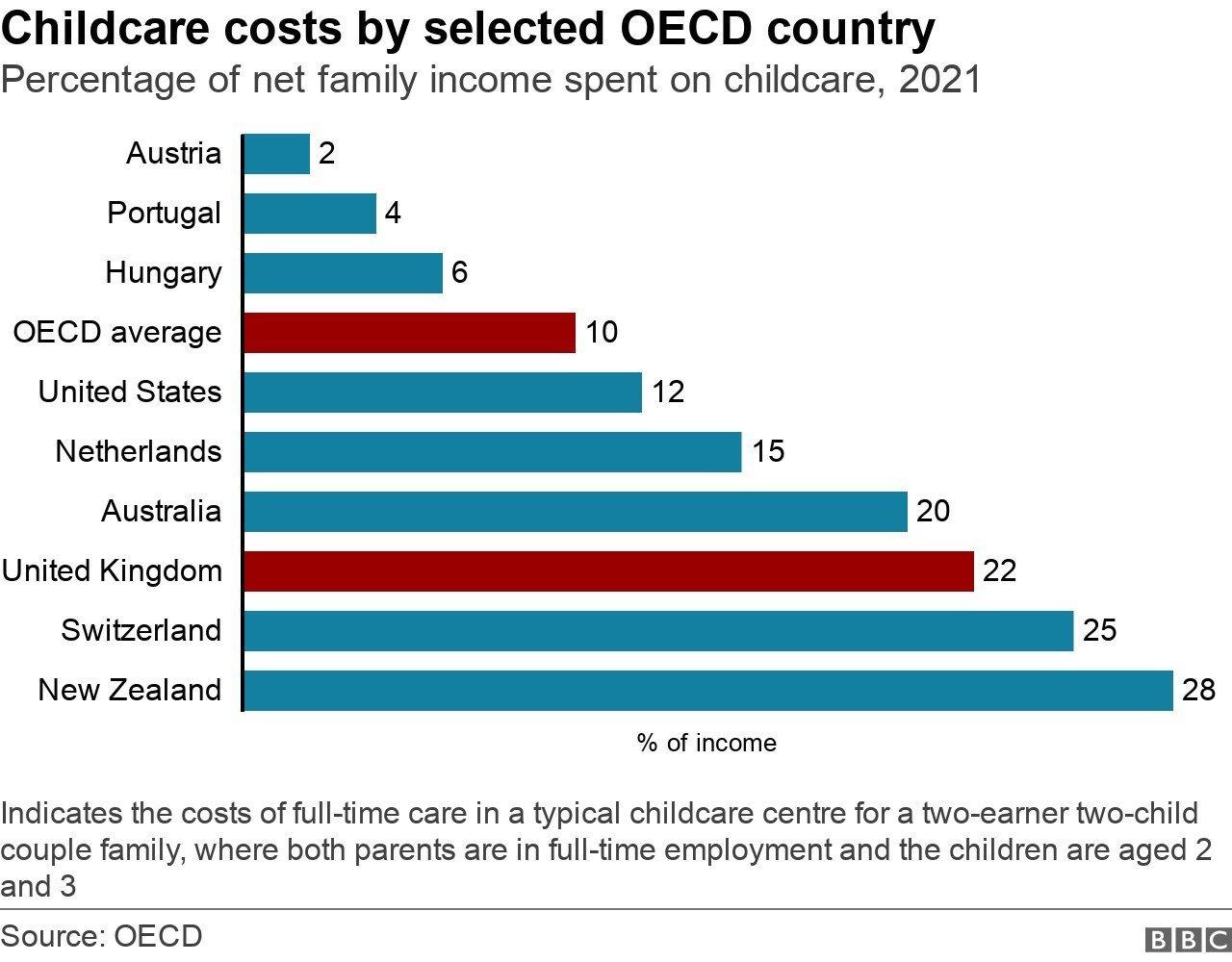Childcare costs soar as providers feel the pinch
- Published

Jo Callaghan (r) says she has been forced to increase the fees at the chain of nurseries she runs with her sister Liz (l)
Childcare providers across Britain are raising prices, and cutting staff and opening hours to cope with funding pressures, new survey data suggests.
The charity Coram Family and Childcare (CFC) questioned all local authorities about childcare costs and provision.
Three quarters of councils that replied said many providers were charging more than last year and were finding it "very difficult" to recruit staff.
The government says it is trying to cut costs and bureaucracy for providers.
Ministers are under pressure from opposition parties and a number of Conservative MPs to prioritise reform of the childcare system.
Jo Callaghan runs a small chain of nurseries in Essex. She says she had to increase her fees by 10% this year, and had also cut back on the number of subsidised childcare places she offers.
"With the funded hours, we currently get £4.50 an hour [from the council] for a three-year-old for 38 weeks a year and our running costs are around £7.70 an hour," she said. "It's woeful."
She added: "In the past, our fee increases have been between 1% and 3%. Last year we had to do 8%, and this year we had to do 10%. We've got no choice in order to remain sustainable."
CFC is warning of the knock-on impact on families, saying young children risk missing out on a crucial part of their education if parents cannot find suitable childcare.
The charity is among those giving evidence to a parliamentary inquiry into the childcare system, which begins its first hearing this week.
In total, 131 out of 205 local authorities across England, Scotland and Wales responded to CFC's annual survey of the costs and availability of childcare in their area.
Its full research will be published in March, but the charity has already shared some of its findings with the BBC.
Around half of authorities reported that many local childcare providers had reduced staff numbers, opening hours and the number of funded places they offered.
A similar proportion raised concerns about the impact of rising energy and food prices.
'Panic mode'
"We're at risk of seeing parents - and mothers in particular - falling out of the workplace," CFC head Megan Jarvie said.
"We're also at risk of children not being able to access the high-quality early education and care - before they start school - that boosts outcomes."
The average weekly cost of a full-time nursery place for a two-year-old in England was £265.38 last year, according to CFC's 2022 childcare survey.
Parents of some two-year olds in England - as well as all three- and four-year-olds - are entitled to 15 hours per week of funded childcare during term-time. Some working families get double that.
Harlequins Nursery in Frome, Somerset, is closing permanently this week because of the financial strain it has been under.
One parent, Matt Sims, said he went into "panic mode" about having to find alternative arrangements for his three-year-old daughter with less than a week's notice.
"My daughter loved that nursery," he explained. "It's quite devastating because the staff there were great."

The Organisation for Economic Cooperation and Development (OECD) places the UK as the third most expensive country for childcare among its members
Separately, analysis of official figures - commissioned by the Labour Party - shows significant regional variation in the change in number of childcare places over the past four years.
In some parliamentary constituencies in England, there has been a dramatic fall in the number of childcare places available per 100 children under five. That includes Torridge and West Devon and South East Cornwall, where there's been a 22% drop.
Shadow education secretary Bridget Phillipson said: "The current turmoil in the childcare provider market is a direct result of the Conservatives crashing the economy and pushing the system to the brink.
"It means local authorities and ultimately hard-pressed parents paying more for less, and the emergence of childcare 'deserts' where good quality affordable childcare just is not available."
A Department for Education spokesperson said: "We continue to review all options to improve the cost, choice and availability of high-quality childcare for working parents.
"We're also investing millions in better training for staff working with pre-school children, and have set out plans to help providers in England run their businesses more flexibly."
Related topics
- Published4 January 2023

- Published11 November 2022
